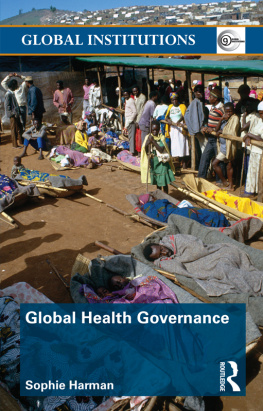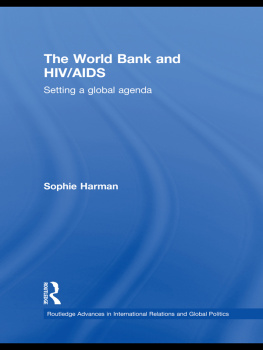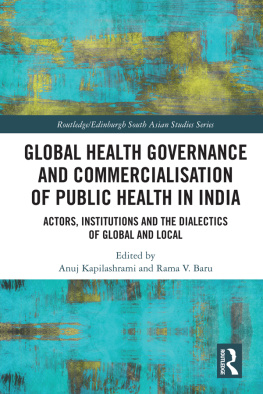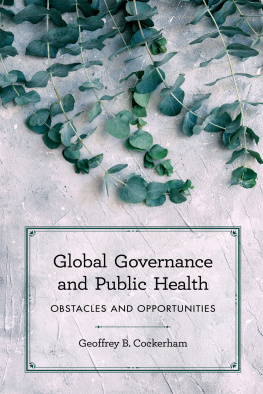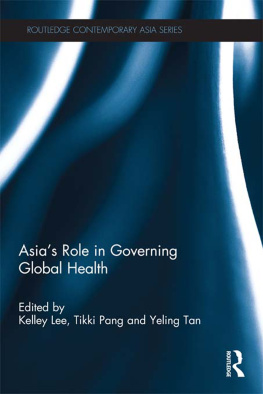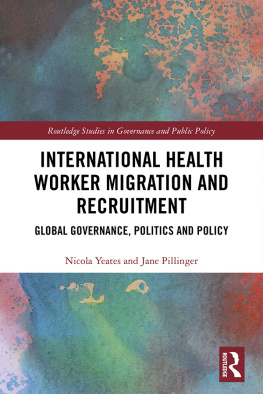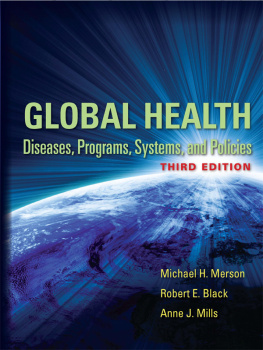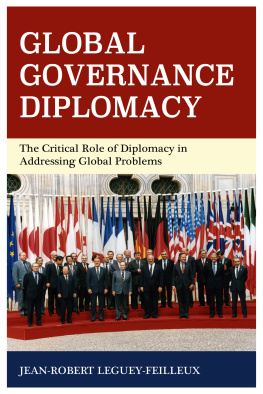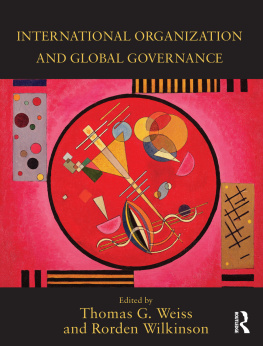Global Health Governance
In light of scares about potential pandemics such as swine and avian flu, the issue of global health and its governance is of increasing concern to scholars and practitioners of medicine, public health, social work, and international politics alike.
Providing a concise and informative introduction to how global health is governed, this book:
explores the various ways in which we understand global health governance;
explains the nuts and bolts of the traditional institutions of global health governance, highlights key frameworks and treaties and their relative successes and failings;
examines the actors in global health governance, their purpose, influence and impact; and
offers an in depth analysis of the effectiveness of global health interventions, focusing particularly on HIV/AIDS, tuberculosis and malaria.
Highlighting the wide variety of actors, issues and approaches involved, this work shows the complex nature of global health governance, encouraging the reader to examine who or what really governs global health, to what outcome, and for whom.
Sophie Harman is a Senior Lecturer in the Department of International Politics, City University, London.
Routledge Global Institutions Series
Edited by Thomas G. Weiss
The CUNY Graduate Center, New York, USA
and Rorden Wilkinson
University of Manchester, UK
About the series
The Global Institutions Series is designed to provide readers with comprehensive, accessible, and informative guides to the history, structure, and activities of key international organizations as well as books that deal with topics of key importance in contemporary global governance. Every volume stands on its own as a thorough and insightful treatment of a particular topic, but the series as a whole contributes to a coherent and complementary portrait of the phenomenon of global institutions at the dawn of the millennium.
Books are written by recognized experts, conform to a similar structure, and cover a range of themes and debates common to the series. These areas of shared concern include the general purpose and rationale for organizations, developments over time, membership, structure, decision-making procedures, and key functions. Moreover, current debates are placed in historical perspective alongside informed analysis and critique. Each book also contains an annotated bibliography and guide to electronic information as well as any annexes appropriate to the subject matter at hand.
The volumes currently published are:
60 Global Health Governance (2012)
by Sophie Harman (City University, London)
59 The Council of Europe (2012)
by Martyn Bond (University of London)
58 The Security Governance of Regional Organizations (2011)
edited by Emil J. Kirchner (University of Essex) and Roberto Domnguez (Suffolk University)
57 The United Nations Development Programme and System (2011)
by Stephen Browne (FUNDS Project)
56 The South Asian Association for Regional Cooperation (2011)
An emerging collaboration architecture
by Lawrence Sez (University of London)
55 The UN Human Rights Council (2011)
by Bertrand G. Ramcharan (Geneva Graduate Institute of International and Development Studies)
54 The Responsibility to Protect (2011)
Cultural perspectives in the Global South
edited by Rama Mani (University of Oxford) and Thomas G. Weiss (The CUNY Graduate Center)
53 The International Trade Centre (2011)
Promoting exports for development
by Stephen Browne (FUNDS Project) and Sam Laird (University of Nottingham)
52 The Idea of World Government (2011)
From ancient times to the twenty-first century
by James A. Yunker (Western Illinois University)
51 Humanitarianism Contested (2011)
Where angels fear to tread
by Michael Barnett (George Washington University) and Thomas G. Weiss (The CUNY Graduate Center)
50 The Organization of American States (2011)
Global governance away from the media
by Monica Herz (Institute of International Relations, Catholic University, Rio de Janeiro)
49 Non-Governmental Organizations in World Politics (2011)
The construction of global governance
by Peter Willetts (City University, London)
48 The Forum on China-Africa Cooperation (FOCAC) (2011)
by Ian Taylor (University of St. Andrews)
47 Global Think Tanks (2011)
Policy networks and governance
by James G. McGann (University of Pennsylvania) with Richard Sabatini
46 United Nations Educational, Scientific and Cultural Organization (UNESCO) (2011)
Creating norms for a complex world
by J.P. Singh (Georgetown University)
45 The International Labour Organization (2011)
Coming in from the cold
by Steve Hughes (Newcastle University) and Nigel Haworth (University of Auckland)
44 Global Poverty (2010)
How global governance is failing the poor
by David Hulme (University of Manchester)
43 Global Governance, Poverty, and Inequality (2010)
edited by Jennifer Clapp (University of Waterloo) and Rorden Wilkinson (University of Manchester)
42 Multilateral Counter-Terrorism (2010)
The global politics of cooperation and contestation
by Peter Romaniuk (John Jay College of Criminal Justice, CUNY)
41 Governing Climate Change (2010)
by Peter Newell (University of East Anglia) and Harriet A. Bulkeley (Durham University)
40 The UN Secretary-General and Secretariat (2nd edition, 2010)
by Leon Gordenker (Princeton University)
39 Preventive Human Rights Strategies (2010)
by Bertrand G. Ramcharan (Geneva Graduate Institute of International and Development Studies)
38 African Economic Institutions (2010)
by Kwame Akonor (Seton Hall University)
37 Global Institutions and the HIV/AIDS Epidemic (2010)
Responding to an international crisis
by Franklyn Lisk (University of Warwick)
36 Regional Security (2010)
The capacity of international organizations
by Rodrigo Tavares (United Nations University)
35 The Organisation for Economic Co-operation and Development (2009)
by Richard Woodward (University of Hull)
34 Transnational Organized Crime (2009)
by Frank Madsen (University of Cambridge)
33 The United Nations and Human Rights (2nd edition, 2009)
A guide for a new era
by Julie A. Mertus (American University)
32 The International Organization for Standardization (2009)
Global governance through voluntary consensus
by Craig N. Murphy (Wellesley College) and JoAnne Yates (Massachusetts Institute of Technology)
31 Shaping the Humanitarian World (2009)
by Peter Walker (Tufts University) and Daniel G. Maxwell (Tufts University)
30 Global Food and Agricultural Institutions (2009)
by John Shaw
29 Institutions of the Global South (2009)
by Jacqueline Anne Braveboy-Wagner (City College of New York, CUNY)
28 International Judicial Institutions (2009)
The architecture of international justice at home and abroad
by Richard J. Goldstone (Retired Justice of the Constitutional Court of South Africa) and Adam M. Smith (Harvard University)
27 The International Olympic Committee (2009)
The governance of the Olympic system
by Jean-Loup Chappelet (IDHEAP Swiss Graduate School of Public Administration) and Brenda Kbler-Mabbott

